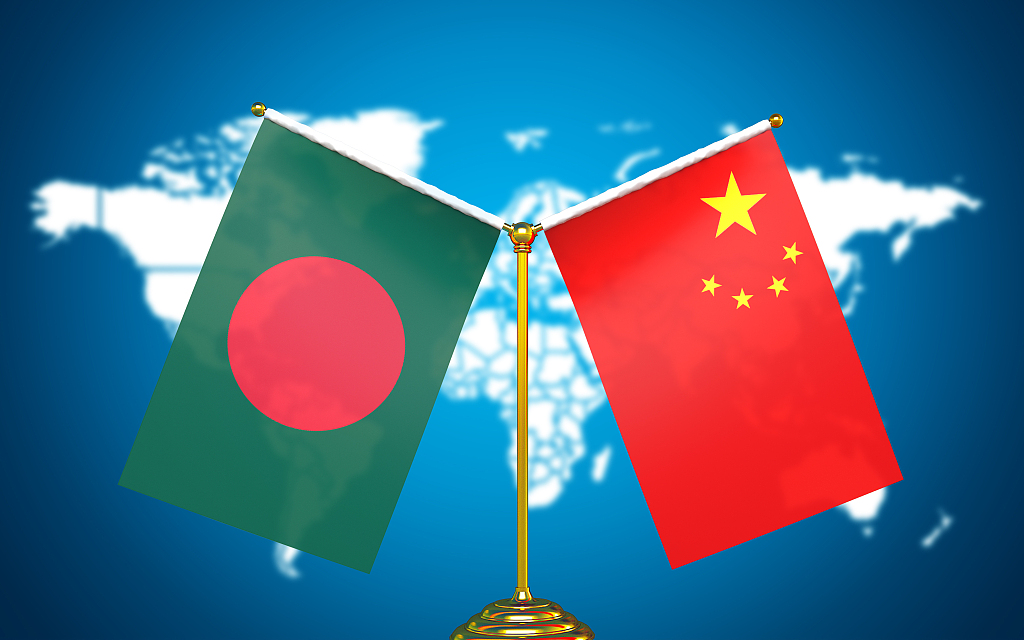
Congratulations sent to Hasina on her reelection as nation's prime minister
China has reaffirmed its commitment to stronger political mutual trust and further alignment in development strategies with Bangladesh, as the reelection of the nation's Prime Minister Sheikh Hasina for a fourth consecutive term bolstered expectations for elevated bilateral ties.
In a congratulatory message extended to Hasina on Thursday, President Xi Jinping underlined Beijing's readiness to carry forward the traditional friendship with Dhaka, advance the high-quality building of the Belt and Road and keep bringing the bilateral strategic partnership to a higher level.
The Bangladesh Awami League led by Hasina, the current ruling party of the South Asian country, secured a landslide victory during an election held on Sunday.
Hasina, the world's longest-serving incumbent female leader, was sworn in on Thursday along with a new lineup of cabinet ministers.
Premier Li Qiang also sent a congratulatory message to Hasina on Thursday.
In an interview with China Daily, Chinese Ambassador to Bangladesh Yao Wen said the congratulatory messages from Chinese leaders fully showcased Beijing's strong emphasis on the further deepening of its strategic partnership with Dhaka.
Yao noted that Hasina has given priority to building up friendship with China, which was the destination of her first official visit overseas in 1996, the beginning of her first five-year term.
The Bangladeshi leader, who has made six visits to China, has always viewed Beijing as Dhaka's most reliable partner and friend.
The Chinese envoy said that ties between China and Bangladesh have become a model of mutual respect and win-win cooperation between developing nations.
Our two nations are set to embrace a historic opportunity to further elevate relations next year, which marks the 50th anniversary of bilateral diplomatic ties, he said.
Lin Minwang, deputy director of the Center for South Asian Studies at Fudan University, said that ties between China and Bangladesh could embrace a new period of positive development with Hasina now securing her fifth term as the leader of the populous nation.
It will be a significant boost to the Belt and Road cooperation between the two nations, as the Belt and Road Initiative has already spurred the transformation of the nation's infrastructure and improved people's well-being, he said.
Support from Beijing is also crucial for Hasina to advance the nation's drive to build a smart country by 2041, Lin added.
China is Bangladesh's largest trading partner, while Bangladesh is China's third-largest trading partner in South Asia. In 2022, trade between the two countries grew by 10.7 percent year-on-year to $27.79 billion.
Bangladesh was the first South Asian country to join the BRI. According to the Chinese embassy, over 670 Chinese companies now operate in Bangladesh and they have been involved in the construction of seven railways, 12 highways, 21 bridges and 31 power stations.
These projects have created 550,000 job opportunities in Bangladesh and played an important role in its economic development, environmental protection and community services, the embassy said.
Hasina has lauded the BRI for opening a new door of development for Bangladesh.
Yao, the ambassador, said that various sectors in Bangladesh have expressed the belief that the BRI is the vision that is aligned most strongly with the South Asian country's national strategies, including its goal of becoming a middle-income country by 2041 through its Vision 2041.
He underscored Beijing's continuous support for the socioeconomic development of Bangladesh.
We will fully leverage the complementary advantages of our economies to make Sino-Bangladeshi economic and trade cooperation a benchmark and model for high-quality construction of the BRI, Yao added.
The robust ties between the two nations are built on a strong foundation of public opinion. According to a recent survey conducted by a Bangladeshi think tank, over 90 percent of the respondents believe that the current state of Sino-Bangladeshi relations is positive.
The survey also found there has been a noticeable increase in the approval and friendliness of the Bangladeshi people toward China, and that an increasing number of Bangladeshi citizens are expressing their wish to travel, study and engage in business in China.
